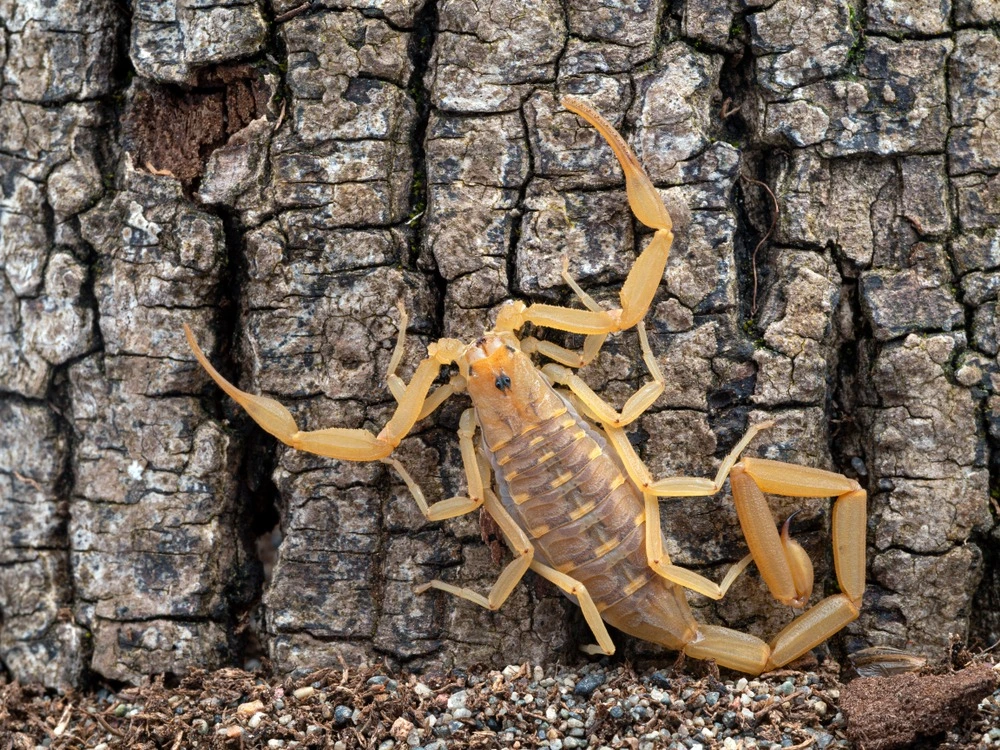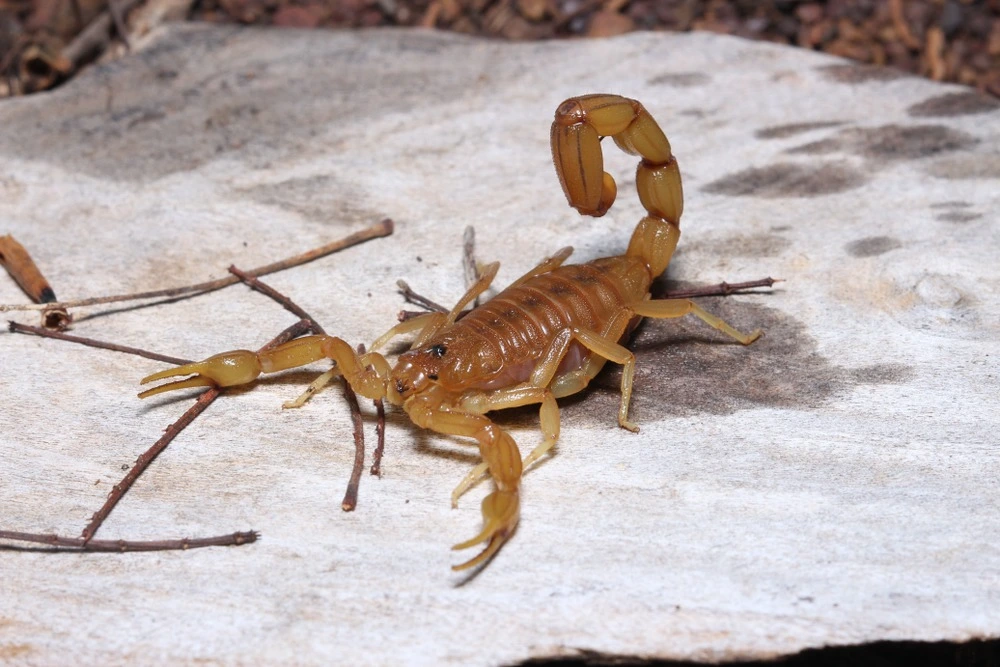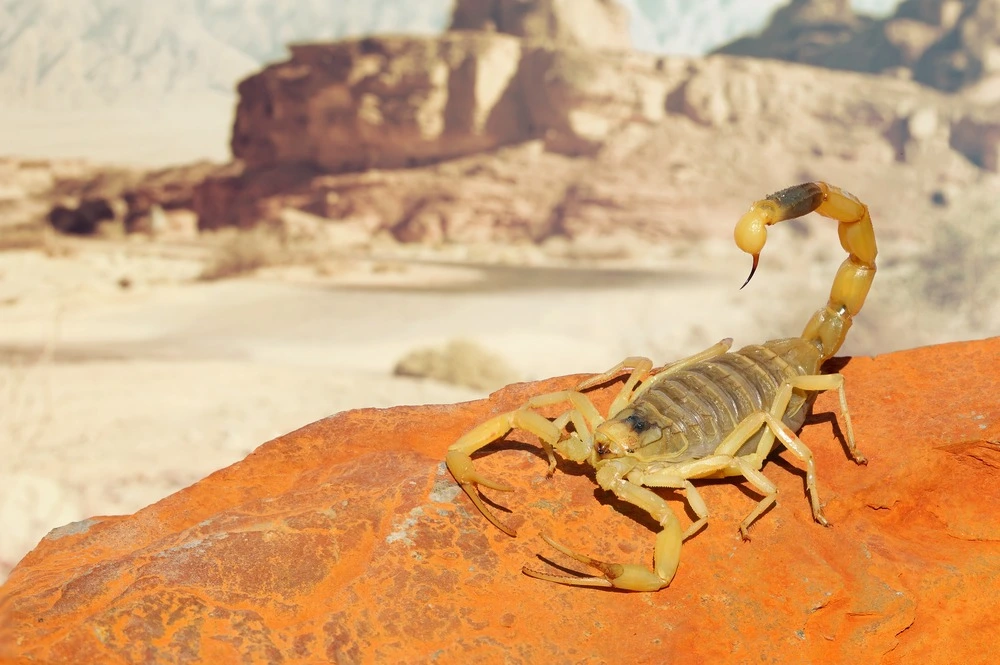
Mosquito Joe explores scorpion toxicity and what to do in the event of a bite.
|
If you just encountered a scorpion, you may be asking, “Are all scorpions poisonous”? While every one of the nearly 2,000 scorpion species in the world is venomous, just 30 to 40 different types of scorpions are potent enough to harm healthy adult humans. However, in the United States, some scorpions are deadly. The most lethal is the Arizona bark scorpion, found throughout the Southwest, particularly in Arizona, Nevada, southeastern California, and parts of New Mexico. Due to medical advances and the accessibility of antivenom, deaths from the Arizona bark scorpion are rare.
Scorpions are fascinating creatures that thrive in a vast range of habitats, from desert wastelands to lush tropical forests. All scorpions are poisonous to varying degrees, stalking their prey armed with venom. Although most often found in deserts and dry grasslands, different types of scorpions live on every continent except Antarctica. There is much to learn about these fascinating, fearsome-looking critters, so let’s dive in! We’ll consider how poisonous scorpions are, how scorpion poison works, what types of scorpions are in the U.S., what to do when a scorpion stings, and how to react if you encounter a scorpion.
Understanding Scorpion Venom: Are Scorpions Deadly?
The question that brings us here is: “Are all scorpions poisonous?” But, technically, scorpions aren’t “poisonous” at all! Scorpion “poison” is actually venom. The difference is a matter of purpose and molecular size. Poisons are defense mechanisms that have tiny molecules that can be absorbed through the skin. Venom, however, is all about offense. Venom molecules are large and require an open wound, so the larger venom molecules can directly enter the victim’s bloodstream. A way to remember the difference is that if you bite something and get sick, it is poisonous. If it bites you and you get sick, it’s venomous!
Are scorpions deadly? Absolutely — to their prey, which typically includes spiders, snails, lizards, rodents, snakes, and other scorpions. Scorpion “poison” is an offensive weapon that quickly immobilizes and kills their prey by shutting down the victim’s nervous system. Scorpions also use their venomous stings for self-defense against would-be predators, larger animals, and rival scorpions in territorial disputes. However, although all scorpions are “poisonous” (venomous), only a few different types of scorpions pose a deadly risk to humans.
Although most scorpions are not deadly to humans, getting stung isn’t fun. Most people experience sharp pain, burning, redness, swelling, numbness, tingling, or even muscle twitching at the site of the sting. They often experience dizziness, sweating, and headaches, too.
Most scorpion stings are similar to bee and wasp stings in the way they affect humans. However, responses vary among individuals, even those who are not sick, elderly, or allergic to scorpions.
Different Types of Scorpions to Watch for in the U.S.
While all scorpions are “poisonous,” only 30 to 40 species worldwide are considered deadly to healthy adult humans. Only one of those species, the Arizona bark scorpion, lives in the U.S. However, there are other types of scorpions that people should watch out for because their stings, while not deadly, are far worse than most.
Let’s meet a few different types of scorpions to watch for.
Arizona Bark Scorpion (Centruroides sculpturatus)

- Location and Habitat: Found throughout the Southwest U.S., particularly in Arizona, Nevada, southeastern California, and parts of New Mexico. Prefers desert and semi-arid regions.
- Venom Potency: Highly venomous; its sting can cause severe pain, numbness, convulsions, and, in rare cases, death in humans.
- Physical Characteristic: Adult Arizona bark scorpions grow up to 3 inches long, with slender tails and pincers.
- Behavior: These nocturnal hunters can climb trees.
- Cool Facts: Like all scorpions, the Arizona bark glows in the dark when hit with UV light. We don’t yet understand why this glowing evolved.
Striped Bark Scorpion (Centruroides vittatus)
- Location and Habitat: Common in the Southern U.S., especially in Texas, Oklahoma, Arkansas, and parts of Kansas. Prefers grasslands, forests, and near human habitation.
- Venom Potency: Mildly venomous; its sting is particularly painful but generally not deadly, causing sharp localized pain, swelling, and nausea.
- Physical Characteristics: Typically about 2.5 inches long, with a yellowish-tan body and two dark stripes along its back.
- Behavior: Nocturnal, hiding under rocks, in wood piles, and in moist, damp areas. Often discovered in basements and bathrooms.
- Cool Facts: Of all the different types of scorpions, this is the one most commonly encountered by people in the U.S. It can survive up to two days underwater by slowing its metabolism!
Yellow Ground Scorpion (Vaejovis confusus)

- Location and Habitat: Found in the deserts and semi-arid regions of Arizona, New Mexico, and parts of California. Prefers sandy, rocky areas.
- Venom Potency: The sting is mildly venomous and can cause sharp pain, swelling, and redness, but it is not considered life-threatening.
- Physical Characteristics: About 2 inches long, with a pale yellow color and a stout, rounded body.
- Behavior: Primarily active at night, hiding in burrows or under rocks during the day. Less likely to enter homes than other species.
- Cool Facts: This species is adept at burrowing, often digging shallow pits in sandy soil. It can survive for months without food!
What Happens When a Scorpion Stings?

When a scorpion stings, it doesn’t lose its stinger like a honey bee, but it does need to recharge its supply of scorpion poison or venom. Venom production is energy-intensive, and it can take a scorpion several days to fully replenish its venom supply. So, most types of scorpions have developed the ability to vary the amount of venom they inject with each sting. Called “venom metering,” this allows scorpions to inject more venom for larger prey or less for smaller prey or mere nuisances.
While most types of scorpions are not deadly to humans, their sting is no joke. A healthy human without allergies is still likely to experience the following symptoms from the single sting of a non-lethal scorpion:
- Immediate pain
- Redness
- Swelling with heat
- Numbness or tingling
- Muscle twitching
- Headache
- Dizziness
- Nausea
- Sweating
Even when it’s not deadly, these symptoms indicate how serious scorpion “poison” is. Healthy adults typically recover from a scorpion sting within hours to a few days. However, the sting should be closely monitored. If the symptoms persist or worsen, seek medical attention.
Though somewhat rare, some people are allergic to scorpion “poison” and may experience a far more severe reaction, including anaphylaxis, which can be life-threatening. Symptoms of an anaphylactic reaction to scorpion “poison” include:
- Severe swelling
- Difficulty breathing
- Rapid heartbeat
- Sudden drop in blood pressure
- Nausea and vomiting
- Hives or a rash beyond the bite site
- Anxiety
Although not all scorpions are poisonous, all types of scorpions can cause these severe symptoms in someone who is allergic to them. Experiencing any of these symptoms following a scorpion sting is a medical emergency. Prompt medical attention is essential and may involve the administration of epinephrine, antihistamines, and corticosteroids. Due to their smaller body size, children and pets are more vulnerable to scorpion “poison.” Even if the initial symptoms appear mild, seek prompt medical attention for any child or pet stung by a scorpion.
What To Do if You Encounter a Scorpion?
What you should do if you encounter a scorpion varies, depending on where you find it. While all scorpions are “poisonous,” they generally avoid people, and most are not deadly to healthy adults. Wear protective clothing like closed-toe shoes, long sleeves, and long pants if hiking or camping in scorpion country. Avoid rocky areas, fallen logs, and dense vegetation where many types of scorpions like to hide. Clear a wide swath of brush, rocks, leaf litter, sticks, and debris around your campsite. Use a tent with a built-in ground sheet, or sleep on a raised cot. While you deserve to enjoy the outdoors, remember that you’re stepping into their natural environment where their role as both predator and prey is important.
If you encounter a scorpion in your yard, don’t panic — just avoid contact. Scorpions are notoriously hard to catch or kill, and attempts to do so can antagonize them into stinging you. You can scoop the scorpion into a box using a trowel or shovel, then discard it or release it well away from your property (or your neighbors’!). Then, be on the watch for more, taking special care if you have pets or small children.
If you find a scorpion in your home, don’t panic. Carrying a jar or a sturdy, topless container, move in very slowly so as not to frighten the critter. Carefully lower the container over the scorpion, then slide a thin piece of cardboard (such as part of a cereal box) or a thick piece of paper under the container to trap the scorpion. Take it far from your home to release it well away from any residences.
Call the pros for scorpion exterminator services if you have a scorpion infestation on your property.
Get a Free Quote - No Sting Included!
Protect Your Home and Family from Scorpions
The best way to get rid of scorpions is not to attract them in the first place. The following preventive measures can help:
- Follow our home hygiene tips to prevent pests. Remove brush piles, leaf litter, rocks, stacked wood, and other debris from your property.
- Trim shrubs and trees so no foliage is in contact with your home’s exterior, providing a handy bridge.
- Use caulk to seal all cracks and crevices in your home’s foundation and walls. Repair screens and fix any leaks indoors or out.
- Remember that scorpions rely on available water and are attracted to clutter. So, eliminate sources of standing water and fix any leaky faucets or irrigation components.
- Use yellow light bulbs in exterior light fixtures to keep from attracting insects.
All scorpions are “poisonous,” and even if most aren’t deadly, their stings are serious. You don’t want these critters as neighbors or house guests. But you don’t have to go it alone. Professional pest control services efficiently prevent scorpions from moving in because they don’t want to be where there are no bugs to eat. Home pest control services protect your residence, while commercial pest control keeps scorpions out of your business.
Trust Mosquito Joe®’s pest control to keep your family, pets, and home safe from scorpions. The Neighborly Done Right Promise® backs all our work because the job’s not done until it’s done right. Request a free quote today.
Let’s make your outdoor spaces fun again and scorpion-free!
